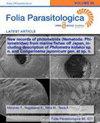弓形虫操纵行为的细节。
IF 1.5
4区 医学
Q3 PARASITOLOGY
引用次数: 0
摘要
在这篇综述中,我以对弓形虫(Nicolle et Manceaux,1908 年)感兴趣的神经科学家的第一人称视角进行了探讨。我对行为操纵作为一种扰动工具的价值进行了反思,以了解大脑中的行为组织。弓形虫感染会降低大鼠对猫出现的嗅觉线索的厌恶感。这种行为变化是宿主与寄生虫共同进化的一个常被讨论的范例,其最终结果是操纵宿主的行为,使寄生虫受益。这种共同进化还意味着,我们可以利用宿主-寄生虫系统作为工具,从根本上了解宿主大脑本身。本文章由计算机程序翻译,如有差异,请以英文原文为准。
Nuts and bolts of the behavioural manipulation by Toxoplasma gondii.
In this review, I take the first-person perspective of a neuroscientist interested in Toxoplasma gondii (Nicolle et Manceaux, 1908). I reflect on the value of behavioural manipulation as a perturbation tool to understand the organisation of behaviour within the brain. Toxoplasma gondii infection reduces the aversion of rats to the olfactory cues of cat presence. This change in behaviour is one of the often-discussed exemplars of host-parasite coevolution, culminating in the manipulation of the host behaviour for the benefit of the parasite. Such coevolution also means that we can use host-parasite systems as tools to derive fundamental insights about the host brain itself.
求助全文
通过发布文献求助,成功后即可免费获取论文全文。
去求助
来源期刊

Folia Parasitologica
医学-寄生虫学
CiteScore
2.70
自引率
0.00%
发文量
25
审稿时长
>12 weeks
期刊介绍:
FOLIA PARASITOLOGICA, issued in online versions, is an international journal that covers the whole field of general, systematic, ecological and experimental parasitology. It publishes original research papers, research notes and review articles. Contributions from all branches of animal parasitology, such as morphology, taxonomy, biology, biochemistry, physiology, immunology, molecular biology and evolution of parasites, and host-parasite relationships, are eligible. Novelty and importance in the international (not local or regional) context are required. New geographical records of parasites, records of new hosts, regional parasite and/or host surveys (if they constitute the principal substance of manuscript), local/regional prevalence surveys of diseases, local/regional studies on epidemiology of well known diseases and of parasite impact on human/animal health, case reports, routine clinical studies and testing of established diagnostic or treatment procedures, will not be considered. One species description will also not be considered unless they include more general information, such as new diagnostic characters, host-parasite associations, phylogenetic implications, etc. Manuscripts found suitable on submission will be reviewed by at least two reviewers.
 求助内容:
求助内容: 应助结果提醒方式:
应助结果提醒方式:


